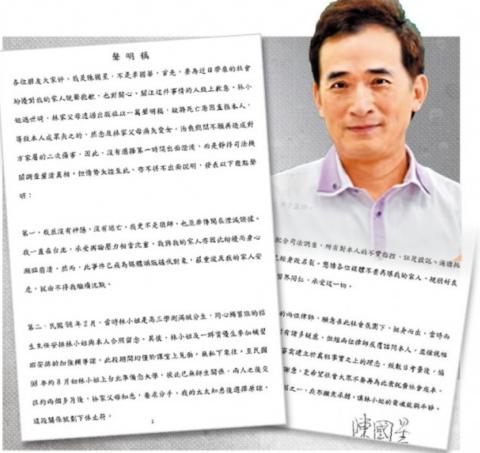The Tainan District Prosecutors’ Office yesterday decided against charging cram-school teacher Chen Kuo-hsing (陳國星) with rape because of insufficient evidence.
The parents of deceased writer Lin Yi-han (林奕含) had said they believe Lin’s mental illness and death by suicide on April 27 was the result of sexual abuse by Chen years earlier.
They said that Lin’s sole published novel, Fang Ssu-chi’s First Love Paradise (房思琪的初戀樂園), a story of a young girl who was raped by her teacher, was drawn from her own experience.

Photo copied by Wang Chun-chung, Taipei Times
On May 1, Tainan prosecutors launched an investigation into Chen, including his alleged assault of Lin and other unidentified victims, Deputy Chief Prosecutor Chen Chien-hung (陳建弘) told a news conference.
The office had called Chen Kuo-hsing and 27 witnesses for questioning, but found no evidence to support an indictment, Chen Chien-hung said.
The office had launched an investigation amid public calls for justice, but Lin’s parents declined to press charges when contacted by the office, he said.
No potential victims or individuals with direct knowledge of potential victims had come forward, he added.
As Lin is dead, the prosecution must rely on the objective examination of direct and indirect evidence to substantiate the opposing claims of the accusers and Chen Kuo-hsing, he said.
The charge of sex with a minor cannot be sustained because phone records — collaborated by testimony from Lin’s classmates — showed that Lin did not have relations with Chen Kuo-hsing before she was 16, he said.
The charge of sexual coercion by abusing authority cannot be established since the physical relationship between Lin and Chen Kuo-hsing happened after Lin left the cram school, he said.
Lin’s medical record was subpoenaed and examined by prosectors and they found no evidence suggesting Lin had ever asked for forensic documentation of injury or sexual assault from any hospital, he said.
Furthermore, Lin’s characterization of the relationship as recorded by her psychiatrist’s notes are inconsistent, which she had described as “coercive” in one case and “merely a romance” in another, Chen Chien-hung said.
“The investigation did not reveal objective and positive evidence to substantiate the subjective speculations of the accusing parties, and there are no sufficient grounds to proceed with the case,” he said.
Tainan Mayor William Lai (賴清德) said while a court of law might lack evidence to try Chen Kuo-hsing, he bears moral responsibility for his actions that led to Lin’s traumatization and suicide.
“Chen Kuo-hsing will have to live with his guilty conscience,” Lai said.
National Taiwan University professor of law Lee Mau-sheng (李茂生) said on Facebook: “Anyone with a superficial knowledge of criminal procedures would have known this was a foregone conclusion.”
The investigation was conducted to calm an indignant public and the prosecutors’ explanation for filing charges are likely the point of the exercise, Lee said.

CHAOS: Iranians took to the streets playing celebratory music after reports of Khamenei’s death on Saturday, while mourners also gathered in Tehran yesterday Iranian Supreme Leader Ayatollah Ali Khamenei was killed in a major attack on Iran launched by Israel and the US, throwing the future of the Islamic republic into doubt and raising the risk of regional instability. Iranian state television and the state-run IRNA news agency announced the 86-year-old’s death early yesterday. US President Donald Trump said it gave Iranians their “greatest chance” to “take back” their country. The announcements came after a joint US and Israeli aerial bombardment that targeted Iranian military and governmental sites. Trump said the “heavy and pinpoint bombing” would continue through the week or as long

TRUST: The KMT said it respected the US’ timing and considerations, and hoped it would continue to honor its commitments to helping Taiwan bolster its defenses and deterrence US President Donald Trump is delaying a multibillion-dollar arms sale to Taiwan to ensure his visit to Beijing is successful, a New York Times report said. The weapons sales package has stalled in the US Department of State, the report said, citing US officials it did not identify. The White House has told agencies not to push forward ahead of Trump’s meeting with Chinese President Xi Jinping (習近平), it said. The two last month held a phone call to discuss trade and geopolitical flashpoints ahead of the summit. Xi raised the Taiwan issue and urged the US to handle arms sales to

BIG SPENDERS: Foreign investors bought the most Taiwan equities since 2005, signaling confidence that an AI boom would continue to benefit chipmakers Taiwan Semiconductor Manufacturing Co’s (TSMC, 台積電) market capitalization swelled to US$2 trillion for the first time following a 4.25 percent rally in its American depositary receipts (ADR) overnight, putting the world’s biggest contract chipmaker sixth on the list of the world’s biggest companies by market capitalization, just behind Amazon.com Inc. The site CompaniesMarketcap.com ranked TSMC ahead of Saudi Aramco and Meta Platforms Inc. The Taiwanese company’s ADRs on Tuesday surged to US$385.75 on the New York Stock Exchange, as strong demand for artificial intelligence (AI) applications led to chip supply constraints and boost revenue growth to record-breaking levels. Each TSMC ADR represents

State-run CPC Corp, Taiwan (CPC, 台灣中油) yesterday said that it had confirmed on Saturday night with its liquefied natural gas (LNG) and crude oil suppliers that shipments are proceeding as scheduled and that domestic supplies remain unaffected. The CPC yesterday announced the gasoline and diesel prices will rise by NT$0.2 and NT$0.4 per liter, respectively, starting Monday, citing Middle East tensions and blizzards in the eastern United States. CPC also iterated it has been reducing the proportion of crude oil imports from the Middle East and diversifying its supply sources in the past few years in response to geopolitical risks, expanding